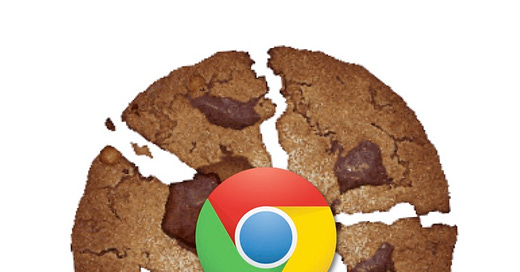Third Party Cookies, AI, and an Industry Desperate for Clarity
The postponing of the long-awaited deprecation of the advertising instrument is yet another blind-side for a beleaguered, battered industry that is essential to the global economy
After years of threats and to-ing and fro-ing, Google made the surprising-yet-not-surprising decision to permanently postpone its plans to deprecate third-party cookies.
There will be, of course, people for whom that sentence means absolutely nothing, so let’s take it from the top.
What are third-party cookies?
Most of the programmatic revenue generated by web publishers comes via matching your profile as a user to your preferences, which are tracked across the internet using something known as a ‘cookie’.
And that’s about as technical as we need to get here - you should know by now you’re being tracked across the internet from site-to-site.
But Google told publishers five years ago now that it was looking to remove the cookie for privacy reasons, and replace it with something - anything - with more privacy for the user.
It was delayed. Google couldn’t find a suitable alternative that retained the requisite advertising targeting, but was working towards it. In 2023, it was delayed again. and now, it’s over. What the alternative will be remains to be seen.
Publishers left in the dark - again
But the point of this is not to discuss the relative merits of this, rather the process in which publishers and media orgs have once again been led a merry dance by a major tech company.
To prepare for this, publishers were actively gathering first-party data on their users to understand which type of audience they have so they can market effectively to advertisers. To be clear - it remains prudent for publishers to continue to gather this data.
But it’s simply another example of publisher businesses being disrupted by the random whims of big tech.
It comes in a year when Google’s helpful content and spam updates have not only remained unclear in their execution but actively leave publishers - particularly independent ones - concerned for their relative futures. If there aren’t rules to follow, then how are they supposed to comply?
And Google’s randomness and lack of clarity comes in the wake of Facebook - what was once a regular audience referrer - gradually eliminating links after years of simply pretending that they had any interest in the publishers which helped grow their platform.
Let’s not forget that comes after Facebook’s famous ‘pivot-to-video’ in which US publishers jettisoned desk writers in favour of promoting video views on their platform, a disaster so notorious that it has its own wikipedia page, cost thousands of jobs and ultimately led to legal action.
We’ve also got Twitter - granted a far lower source of traffic, but serving a broader exposure purpose before Elon turned the lights out and made it pay-as-you-play, but only if you’re on the right side of the equation.
All the wrong AI pursuits
And then there’s AI. Google, Open AI, Meta, and countless other companies are chasing it down, but are taking the regurgitated content from publishers and spitting it back out to users, leaving publishers out of the equation.
And now Google is actively warning its own employees not to share information with Chatbots, and is aware that hallucination, where AI is further trained on AI and is therefore compromised, can feed out false information.
What’s the meaning of this letter?
It’s simple - publishers simply need protection.
There are good ones and bad ones, big ones and small ones, broad ones and niche ones, written ones and multimedia ones, serious ones and amateur ones, and they are all systematically having their content compromised in every conceivable way.
They’ve been demonetised, been promised things that were never delivered, and now are actively having their labour stolen from them. And it’s never going to change until there’s regulations put in place to actively police this stuff.
Free publishing has to survive and has to be maintained for all, as it was the basis for, by definition, net neutrality and the foundations of the open internet. And it’s now being used against them.
In short, we need news, we need all kinds of news, and it needs to be open, scrutable, and successful on its individual merits. And arguably for the first time in the internet era, it feels like we might be heading away from that ideal.





